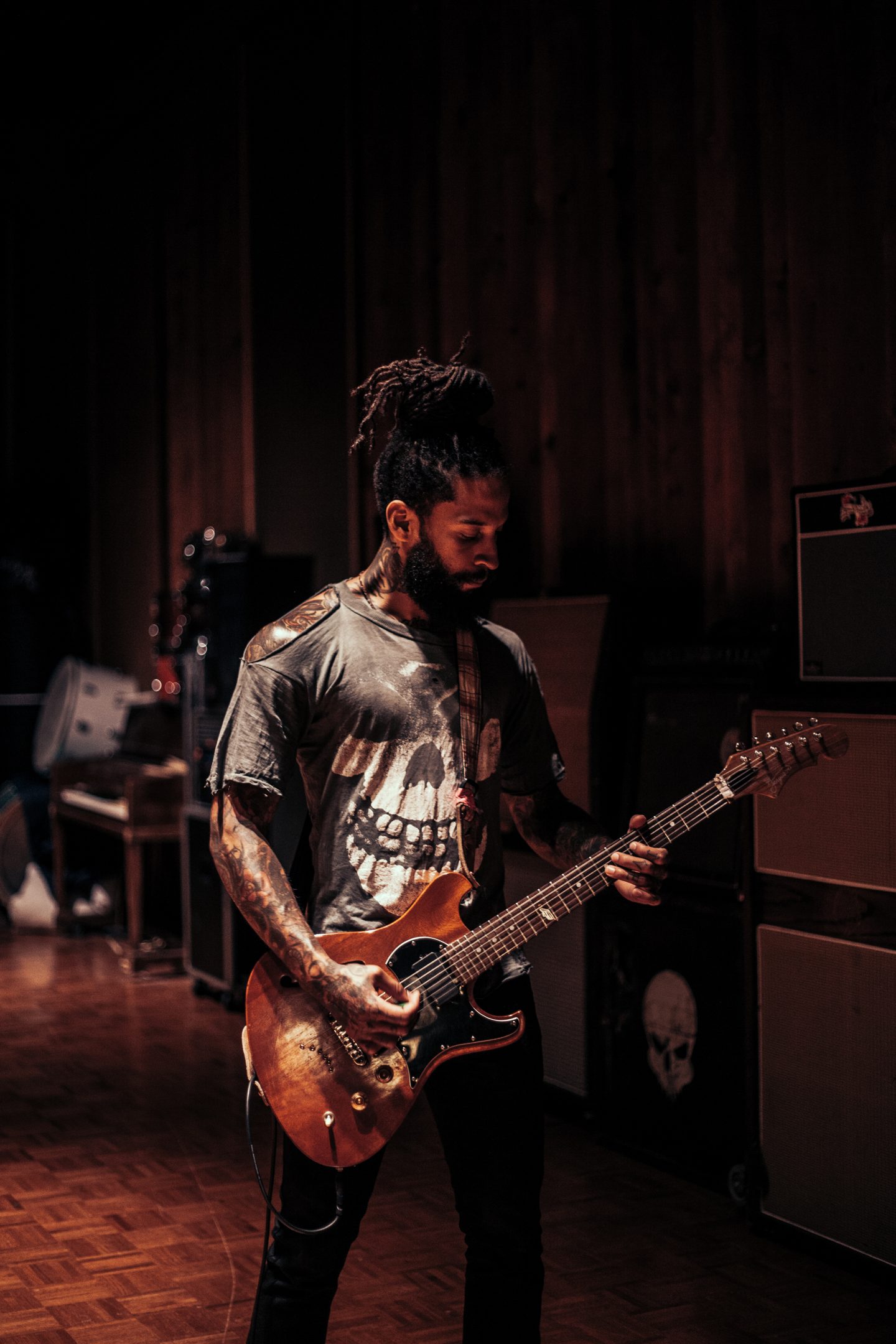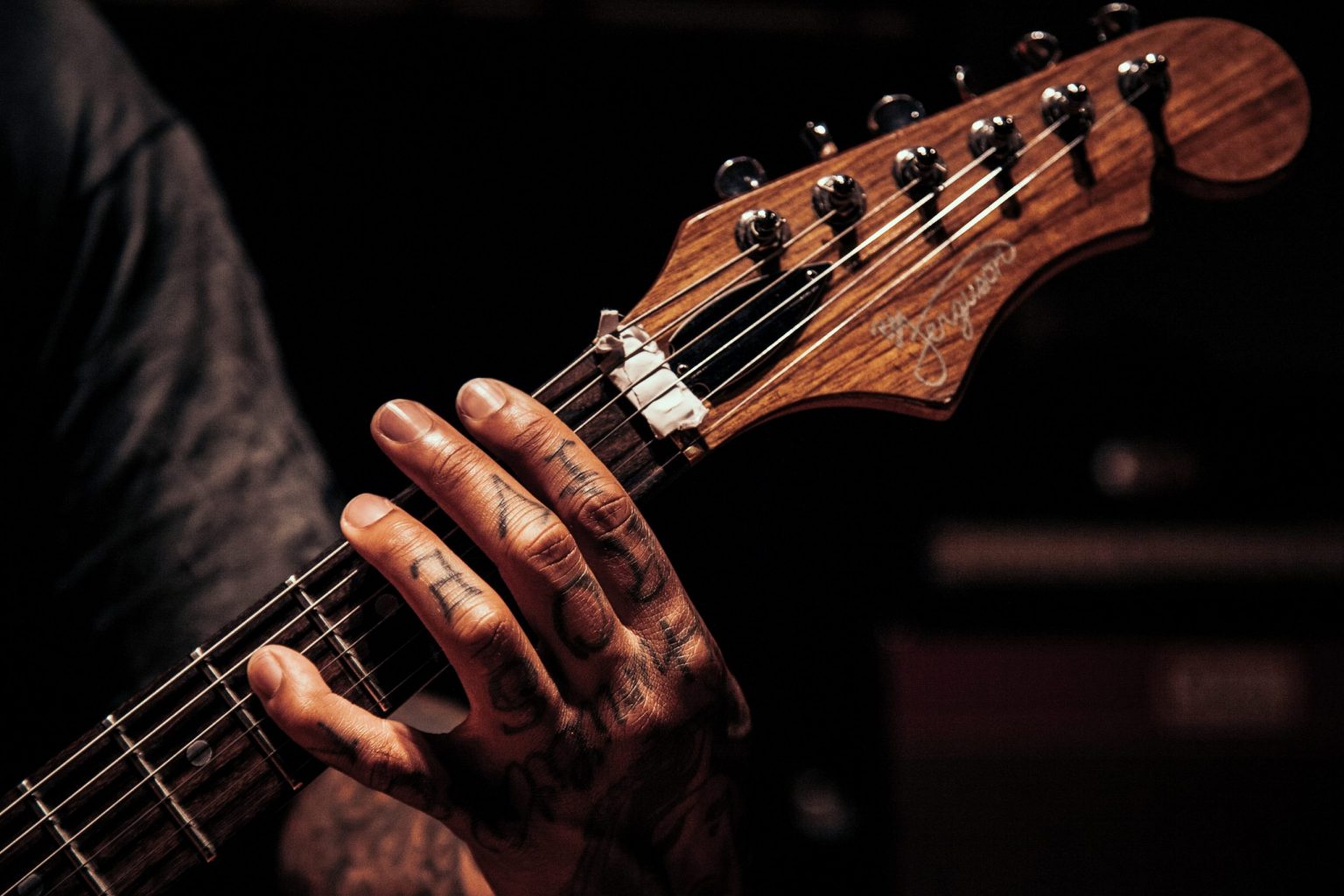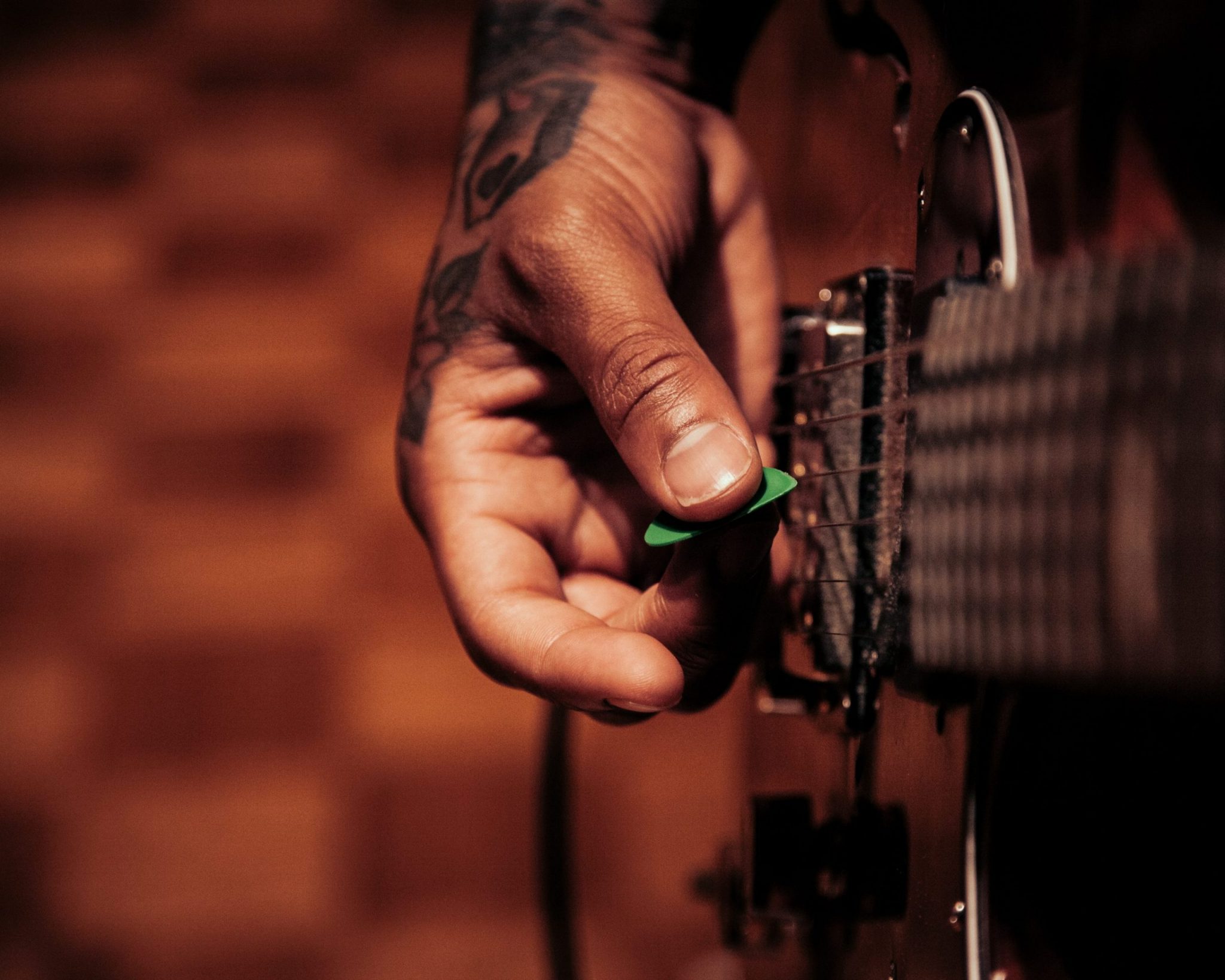For a while, Stephen “Stevis” Harrison’s identity was known almost solely as, “the guitarist from The Chariot.” A self-taught musician, he spent the bulk of the last ten years touring in bands and living life on the road. Now, two years after The Chariot’s breakup, Stephen has successfully transitioned back to normal life, and is learning how to parlay the hustle and rhythm from his former lifestyle, into a new creative stride.
A Tuesday afternoon in Atlanta, and I’m wandering around the parking lot of what looks like an abandoned warehouse on the set of The Walking Dead. I found my way here after my GPS led me through the thick of Cheshire Bridge Rd. – a street widely referred to as Atlanta’s red-light district.
I’m looking for Stephen Harrison’s apartment.
I would come to find out twenty minutes later, that the “apartment” I was looking for was actually nestled away on the second story of an industrial unit that had been converted into the now infamous Glow in the Dark Studios. It is within this same studio space that some of the hardcore and alternative music scene’s most iconic acts have created their greatest records. From Tooth & Nail veterans like As Cities Burn and Underoath to others like The Devil Wears Prada, Becoming the Archetype and of course Harrison’s alma mater – The Chariot.

Stephen behind what he does best at Atlanta’s iconic Glow in the Dark Studios.

Self-taught, Stephen has never stressed the importance of the guitar in his life.
“Just a heads up,” Harrison chuckles as we step inside. “I forgot that there was a band crashing upstairs – so we’re going to have to be kind of quiet. I haven’t tested it, but I think you should be able to hear the amps still. Also, we’ve got about two hours and then the studio is going to be used – you think we can get what you need in that time?”
It feels like a conversation I’m having with someone’s really well-mannered roommate. I’m beginning to immediately recognize what I came here to uncover today. It was becoming abundantly clear, that there actually is no separation between Stephen’s home/personal life and his work life – or, should I say, creative life. They’re one in the same. He’s found a way to seamlessly bridge the deep chasm between work and play that often remains vividly desolate in the lives of many.
Growing up with an interest in punk rock was what served as the initial catalyst to his career. A self-taught guitarist, his early affinity for both the instrument and the genre provided sufficient curiosity to pave a successful runway for the next decade of his life as a touring musician.
“He’s found a way to seamlessly bridge the deep chasm between work and play that often remains vividly desolate in the lives of many.”
“I started playing guitar when I was in 6th grade. My mom got me one for Christmas. Around that same time, I started listening to punk rock. The two went hand-in-hand for me. It’s kind of a miracle that I stuck with guitar because I don’t have a lot of patience for new things. I learned pretty quickly because I didn’t have someone standing over me telling me that this is the right or wrong way to do it. I just kind of learned by myself.”
In-and-out of bands during his high school years, Stevis’ stride hit when he joined The Chariot in 2009 as their rhythm guitarist. At the time, Stephen was the frontman for the group, Written in Red. While fronting for the group, he was also doing double duty handling all of The Chariot’s merch on tour when the rhythm guitar spot opened up.
“Even a merch guy on tour has a sense of pride of being on tour. You’re still traveling and you’re still ‘with the band.’ But, on a mental and personal level, it’s a very weird thing to be a young guy in a band. It’s a very unnatural way to live. It does something to your ego that isn’t good. I developed a lot of complexes and problems that I didn’t even realize I had until I stopped touring and had friends be like, ‘Hey, man, – that sucks about you’ and they had to help bring me back down to earth.”

The difficulty of learning an instrument and fumbling through it has had real-world carryover for Stephen.

Perseverance, combined with an innate competitive spirit, is what enabled Stephen to become a successful musician. Characteristics that have carried over in his post-career.
“That’s not how the real world works.”
From 2009 to the group’s unanimous decision to dissolve in 2012 before their final farewell tour, Stephen would tour nationally and internationally with the group. Hometown venues like the iconic Masquerade in Atlanta, Georgia were of course frequented in between the group’s European tours that took the band everywhere from Stuttgart to Cologne. Only in his early 20s, Harrison had been to more places than most people double his age and had been thrust into the spotlight of celebrity guitarist.
It wasn’t long until life on the road became mentally, physically and emotionally draining.
“Not having a home life was for me the hardest part. Coming home to nothing was difficult. Not having time to hold a relationship. Touring financially screwed my mind up. Because you get paid everyday in some sense. Sometimes just to eat. On tour you get per diems. ‘Yo – where’s my fucking $10 to eat today?’ That’s not how the real world works.”
It’s a mindstate that most touring musicians undertake – the complete and inherent understanding of one’s identity within the context of tour life, but the struggle that comes with enduring the long hours, gnarly travel itineraries and the complete uprooting of the normalcies that others would find commonplace. But for The Chariot, when faced with the same personal and professional crossroads of a decade under the influence of subculture fame, the group made the decision to quit while they were on top.
“We were on Warped Tour at the time and that tour sucks. It just kinda started wearing on us. One day we had off and our guitarist Brandon was like, ‘Hey guys, I think I’m done. I want to spend more time with my wife at home.’ And for me, I was like, “If he’s out, I’m out. I’ve known him since I was 15.”
In a matter of 10 minutes, a decade-year-old band had unanimously decided that it was time to bring things to a conclusion. “It was the quickest talk ever. So quick. A 10 year situation ended – the whole talk was about 10-15 minutes. The rest of the tour we literally just fucked everything up because we knew it was one of our last tours. We were like getting in fights with people and breaking shit on purpose. We were actually hoping they would kick us off tour.”
Now three years into life after tour, Harrison has found a new creative stride that he feels is way more sustainable. But it took time. One of his first “normal jobs” after tour was as at a deli before leveling up to a sales associate position at Urban Outfitters.
“I went from playing in The Chariot to working at a deli,” Stephen recalls. “My first customers were people that knew me from The Chariot. I remember when I started worked at Urban Outfitters the managers would always stick me at the front of the store folding shirts. People would come in all the time and be like, ‘Dude! Fucking…’ Bands would be on tour and come in and be like, ‘Dude…’ with a confused look always on their face.”


And when it was all said and done, Stephen hung up his guitar as a member of The Chariot, one last time.
“A 10 year situation ended in 10 minutes. The rest of the tour we literally just fucked everything up because we knew it was one of our last tours”
And since that time, he has found ways to evolve his core passion by transitioning from backing rhythm guitarist to frontman and singer. He’s been working on a new project Mount Moon, a band that he’s been quietly building within the parameters of infrequent studio sessions that he and another friend manage to slot in within the midst of their newfound daily routines.
He’s also learning the process of parlaying his musical influences into a wide range of other creative opportunities outside of the fretboard. “Even when I was at the height of tour mode, I don’t think that I thought it was my end all. I love so many other things. I love fashion, modeling, streetwear, menswear. I love good design and good aesthetic. I assume that my next move would be heavily influenced by a combination of those things.”
Harrison’s reflection on that era doesn’t mean that he has a distaste for it, it actually means that he has a better understanding of the implications from those years on the bigger picture. His ties into the music world aren’t going anywhere, yet he’s learning how to use that insight to fuel his next creative output.
He pauses for a moment as he thinks about where he was three years ago compared to present day. “Being home now on the outside and looking into the world of touring, just reminds me of all the difficult things that my friends are going through. I try to be at every single show that I can be. To see them and encourage them. I let people know that I’m not touring anymore and shit is fine.”


















